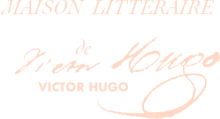Speech by Mr. Daisaku Ikeda, Founder,
on the occasion of the inauguration, June 21, 1991.
As the founder of this Victor Hugo literary house, I am very honored by your presence here today, despite the many occupations that are yours, you who represent France, a great country of culture. My gratitude also goes to the official representatives of twenty countries of the world who were kind enough to join us.
I had the honor of receiving a message from the President of the French Republic, Mr. Mitterrand: « I hope that the inauguration of your literary house will be a great success. » And for that, too, I am sincerely grateful.
The light radiated by this great soul that was Victor Hugo, this beacon of 19th century French literature, continues to shine with all its brilliance in many areas, beyond the limits of time and space. It is the wish to keep Hugo’s literature this very broad influence which presided over the creation of this house of Rocks, to which he was very attached, so that it is like a rainbow towards the new century.
As soon as the creation of this literary house to the glory of Victor Hugo was announced, a very large number of people interested in this project offered their collaboration, in France as well as in other countries of the world. I am very touched by the sincerity with which these people have helped to revive this « Castle of Literature », in truth, a People’s Castle dear to Hugo’s heart.
As it is so well said in these verses of Hugo engraved on a plaque in the garden. Bièvres is one of those places, « whose serene, inexhaustible, intimate beauty fills the soul with a serious and sublime oblivion of all that the earth and man have that is bad. » In this site, the beauty of which touches me deeply, I would like this house to be first of all loved by the inhabitants of this region and for it to constitute one of their great riches.
As for so many others around the world, Hugo was for me a precious companion of youth. It was in the midst of the din of the Second World War, at the age of fourteen or fifteen, that I met his masterpiece, Les Miserables. One after another, my four older brothers were mobilized, and for my part, I suffered from tuberculosis which prevented me even from continuing my studies as I wished. In these circumstances, each page of this novel widened a little more my discovery of the world and of the heart of man, vast even than the sea and the sky.
Later, in contact with my master who also had great admiration for Hugo, I studied with my friends Quatrevingt-Treize. We imbued ourselves with a dazzling spirit: the courageous determination to fight for human rights, the desire to share with all, the treasures of education, in a word, a vibrant love of humanity. All of this is forever etched in my memory. What we learned of Hugo’s deeds illustrated the triumph of a man whom nothing had been able to subdue, despite the storm of criticism and misunderstanding. This is a great encouragement for us who are committed to creating a new humanistic culture. Today, more than ever, needs this light of Hugo’s humanism.
I will never stop praying that this house will become a « beacon of the spirit » that will radiate the noble French spirit of freedom, equality, fraternity, towards the world and towards the future. On the occasion of the three hundredth anniversary of Shakespeare’s birth in 1864, there was also a commemoration of this event in Paris. Hugo, then in exile in Guernsey, sent a message of congratulations. The French, he said, glorified the Englishman Shakespeare. And so, by celebrating this genius of literature, erasing borders, they were celebrating the whole earth. In an even broader sense, it is tantamount to glorifying the supreme law of the spirit, omnipresent in the universe.
Hugo foresaw that the sharing of masterpieces of literature was a harbinger of the union of all humanity. And he loudly proclaimed: « This is the work you are inaugurating; cosmopolitan, human, united, fraternal, disinterested work of all nationalities, superior to local demarcations; magnificent adoption of Europe by France, and of the whole world by Europe. From a party like this, it flows from civilization. »
I would like to see with all of you, this literary house, garden of culture, fruit of the great hope of our Hugo, magnificently celebrate the bicentenary of his birth in the year 2002.
We will thus open the entrance into the century of the man and the people that Hugo called for.
Finally, I wish everyone here present better health, to carry out all that they will undertake, and I hope that this great country, France, will forever perpetuate the glory of having seen the birth of Victor Hugo.
